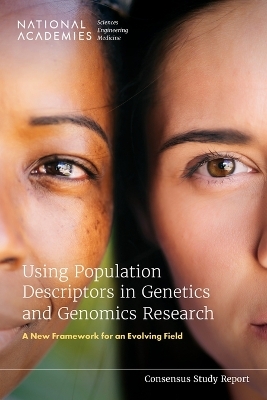
Using Population Descriptors in Genetics and Genomics Research
A New Framework for an Evolving Field
Seiten
2023
National Academies Press (Verlag)
978-0-309-70065-8 (ISBN)
National Academies Press (Verlag)
978-0-309-70065-8 (ISBN)
- Titel z.Zt. nicht lieferbar
- Portofrei ab CHF 40
- Auch auf Rechnung
- Artikel merken
Genetic and genomic information has become far more accessible, and research using human genetic data has grown exponentially over the past decade. Genetics and genomics research is now being conducted by a wide range of investigators across disciplines, who often use population descriptors inconsistently and/or inappropriately to capture the complex patterns of continuous human genetic variation.
In response to a request from the National Institutes of Health, the National Academies assembled an interdisciplinary committee of expert volunteers to conduct a study to review and assess existing methodologies, benefits, and challenges in using race, ethnicity, ancestry, and other population descriptors in genomics research. The resulting report focuses on understanding the current use of population descriptors in genomics research, examining best practices for researchers, and identifying processes for adopting best practices within the biomedical and scientific communities.
Table of Contents
Front Matter
Summary
SECTION I: PAST AND CURRENT USE OF POPULATION DESCRIPTORS IN GENETICS AND GENOMICS RESEARCH
1 Population Descriptors in Human Genetics Research: Genesis, Evolution, and Challenges
2 A Multiplicity of Descriptors in Genetics and Genomics Research
SECTION II: RECOMMENDATIONS
3 Guiding Principles
4 Requisites for Sustained Change
5 Guidance for Selection and Use of Population Descriptors in Genomics Research
6 Implementation and Accountability
Appendix A: Study Approach and Methods
Appendix B: Glossary
Appendix C: Table of International Programs
Appendix D:Decision Tree for the Use of Population Descriptors in Genomics Research
Appendix E: Committee and Staff Biosketches
Appendix F: Disclosure of Unavoidable Conflict of Interest
In response to a request from the National Institutes of Health, the National Academies assembled an interdisciplinary committee of expert volunteers to conduct a study to review and assess existing methodologies, benefits, and challenges in using race, ethnicity, ancestry, and other population descriptors in genomics research. The resulting report focuses on understanding the current use of population descriptors in genomics research, examining best practices for researchers, and identifying processes for adopting best practices within the biomedical and scientific communities.
Table of Contents
Front Matter
Summary
SECTION I: PAST AND CURRENT USE OF POPULATION DESCRIPTORS IN GENETICS AND GENOMICS RESEARCH
1 Population Descriptors in Human Genetics Research: Genesis, Evolution, and Challenges
2 A Multiplicity of Descriptors in Genetics and Genomics Research
SECTION II: RECOMMENDATIONS
3 Guiding Principles
4 Requisites for Sustained Change
5 Guidance for Selection and Use of Population Descriptors in Genomics Research
6 Implementation and Accountability
Appendix A: Study Approach and Methods
Appendix B: Glossary
Appendix C: Table of International Programs
Appendix D:Decision Tree for the Use of Population Descriptors in Genomics Research
Appendix E: Committee and Staff Biosketches
Appendix F: Disclosure of Unavoidable Conflict of Interest
| Erscheinungsdatum | 20.07.2023 |
|---|---|
| Verlagsort | Washington |
| Sprache | englisch |
| Maße | 152 x 229 mm |
| Themenwelt | Studium ► 2. Studienabschnitt (Klinik) ► Humangenetik |
| Sozialwissenschaften ► Soziologie ► Empirische Sozialforschung | |
| ISBN-10 | 0-309-70065-5 / 0309700655 |
| ISBN-13 | 978-0-309-70065-8 / 9780309700658 |
| Zustand | Neuware |
| Informationen gemäß Produktsicherheitsverordnung (GPSR) | |
| Haben Sie eine Frage zum Produkt? |
Mehr entdecken
aus dem Bereich
aus dem Bereich
Die revolutionäre Medizin von morgen (Lifespan)
Buch | Softcover (2020)
DuMont Buchverlag
CHF 22,40
Eine sehr persönliche Geschichte | Der New York Times-Bestseller
Buch | Softcover (2023)
Ullstein Taschenbuch Verlag
CHF 30,75
Buch | Softcover (2022)
John Wiley & Sons Inc (Verlag)
CHF 169,95


